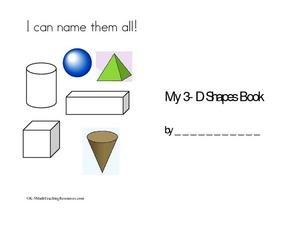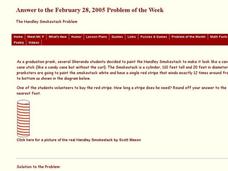Curated OER
Volume of Solids: Algebra/Geometry Institute
Use this volume of solids lesson plan to have learners find the surface area and volume of cylinders, pyramids, and prisms. They place cubes inside three-dimensional figures to determine the volume. Worksheets and answers are provided.
Curated OER
Volume of Pyramids and Cones
High schoolers find the volume of pyramids and cones. In this volume of pyramids and cones lesson, learners explore the relationship between the volumes of prisms and pyramids. They investigate the relationship between pyramids and cones.
Curated OER
Volume of Solids
In this volume of solids worksheet, tenth graders solve and complete 20 various types of problems. First, they write the formula needed to find the volume of each solid. Then, pupils use the Pythagorean theorem to find the measure of the...
Curated OER
Living in a Geometrical World
Students participate in a series of hand-on, online, and multimedia activities to examine 2 dimensional and 3 dimensional shapes. They describe common geometric solids. They construct rectangular prisms using straws and ribbon.
Curated OER
Cylinders and Scale
Students review what a cylinder is and how a cylinder is measured. They build a variety of cylinders with different heights and radii. They compare the surface area and volume of each cylinder and discuss anything that surprises them...
Curated OER
Popcorn Math
Everyone loves popcorn! Use this treat to teach math concepts including place value, estimating, graphing, and volume. Eight possible activities are included, and they can be modified to fit all grade levels.
Curated OER
Volume of Cylinders and Cones
Line drawings of a circle, a cylinder, and a cone at the top of the page contain the formulae for area and volume of each shape. Learners complete the missing information in a chart that lists diameter, radius, height, and area and...
Curated OER
Measurement: Cylinders
Math scholars observe and demonstrate how to calculate the surface area and volume of cylinders. They analyze pictures of various cylinders on a handout, solve problems on two worksheets independently, and discuss the answers to the...
Curated OER
Sorting 3-Dimensional Shapes
The sorting is simple here: Does this three-dimensional figure have a curved surface or not? Scholars review an example before trying this on their own with nine figures including a sphere, cylinder, prism, cube, cone, and pyramid. They...
Curated OER
Understand Categories of Shapes
This colorful set of shapes and figures is the data set learners need to fill out an extensive table. For each of 11 types of shapes or figures they record the quantity and how many corners and sides each has. This becomes more difficult...
Curated OER
Volume of Rectangular Prism and Cylinder
Learners calculate volume of rectangular prisms and cylinders. They draw and label figures to use the formulas to calculate the volume of rectangular prisms. In addition, they use objects to calculate volume in a hands on activity.
Curated OER
Volume of a Cylinder
Middle and high schoolers calculate the volume of cylinders. They measure the height, radius and diameter of cylinders. Following given formulas, learners calculate the area and volume of the cylinder. They compare cylinders and predict...
Curated OER
Name the 3 Dimensional Shapes of the Objects
Here are six solid figures for learners to identify. The names are listed along the left side and the shapes pictured on the right. Each shape is shown as a familiar object instead of just a drawing. Figures include a cylinder,...
Curated OER
I Can Name Them All!
Six 3-D shapes are featured in this figure-recognition book template. As they create a "My 3-D Shapes Book," young scholars place shapes on the appropriate pages, which already have text indicating the shape and its color. Although it is...
Curated OER
Cylinder: Teacher Notes
Middle schoolers construct a basic cylinder out of a piece of paper, then answer seven questions about their cylinder. Questions have to do with measurement, volume, radius, etc.
Curated OER
Shape Hunt
Learners explore two-dimensional and solid shapes. In this shapes and patterns geometry lesson, students work with a partner to create identifiable objects using tangrams. Learners describe the attributes of their shape and their partner...
Curated OER
3-D Attributes
Students explore geometric solids. In this geometry instructional activity, students listen to the book The Greedy Triangle by Marilyn Burns, then work in groups to sort geometric solids into various categories. Students define geometric...
Curated OER
Introduction to Minerals
Students discover how crystal structures go together to create minerals. In this earth science lesson, students work in groups to create 3-dimensional shapes of crystals that they then put together in a compact structure.
Curated OER
Barber Pole
In this geometry worksheet, students calculate the length of the rotating stripes around a cylinder. There is an answer key with this problem.
Curated OER
Volume and Surface Area
In this volume and surface area learning exercise, students find the volume and surface area of 8 prisms and cylinders. Students find the volume and surface area given a diagram with various measurements labeled.
Curated OER
Math Regents Exam Questions: Surface Area and Volumes
In this surface area and volume worksheet, students solve 4 short answer and multiple choice problems. Students find the volume and surface area of cylinders and prisms.
Curated OER
The Geometry of Solids
In this solids worksheet, students compute the volume of prisms, cylinders, pyramids, spheres and cones. This seven-page worksheet contains approximately 68 problems.
Curated OER
Geometry: Calculating Volumes
For this volume worksheet, students find the volume of 6 prisms/cylinders. Students use a picture and given measurements of the prisms/cylinders to find the volume.
Curated OER
The Handley Smokestack Problem
In this smokestack worksheet, students determine the length of a stripe that winds around a cylinder shaped smokestack. This one page worksheet contains one multi-step problem. The answer is provided at the bottom of the problem.

























